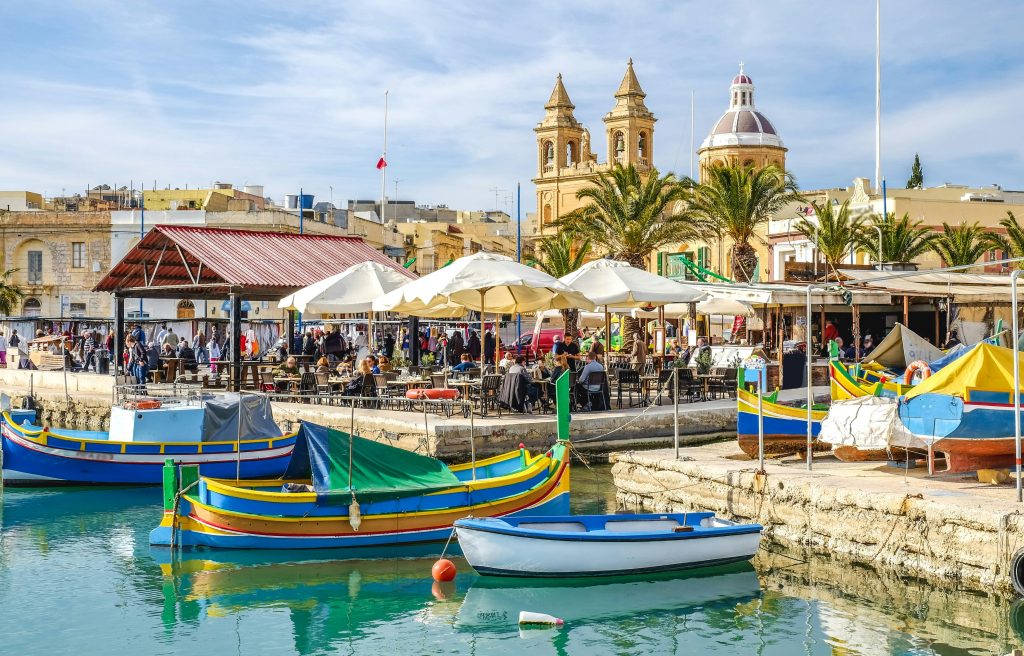Malta attracts visitors and expats from all over the world with its striking coastline, historic architecture, enviable climate, favourable tax regime and variety of residency options. However, beneath the surface of the postcard-perfect destination lies a culture that is rich, complex and at times utterly surprising.
For newcomers – whether they are relocating for work, seeking retirement in the sun, or visiting for an extended holiday – Malta can deliver a form of culture shock that is both amusing and enlightening at the same time. The country’s small size belies its cultural dynamism and understanding all of these nuances is key to settling in comfortably, whether it is for a long or short time. We look at some of the most distinctive cultural quirks, social norms and unexpected contrasts that newcomers often encounter when they first arrive in Malta: from the island’s passionate driving habits and boisterous festas to its deep-rooted Catholic traditions. Throw in a curious blend of Mediterranean and British influences and Malta can be as confounding as it is charming. Understanding these unique aspects not only helps expats and visitors avoid frustration, but also opens the door to a deeper, more authentic experience of island life. Here are a few of the cultural surprises that await any newcomers in Malta.
Life at the Maltese pace
One of the first aspects that catch visitors off guard is Malta’s unique rhythm of life. It operates in a space between Mediterranean leisure and Southern European liveliness. Daily schedules often seem relaxed, particularly to those that are arriving from countries where individuals are used to sticking to rigid timetables and in many cases, arrive even before the time for any appointments or meetings. These rarely begin precisely on time and local transport can be erratic as detours can appear unannounced. Yet, the Maltese approach these inconveniences with mostly good humour and much debate. There is an underlying philosophy: stress is optional and most problems can wait until after lunch… or in the case of workmen completing a job, next week.
A linguistic mosaic
The language dynamic in Malta is another point of cultural curiosity. Maltese, the national language, is a Semitic language rooted in Arabic but heavily influenced by Italian, English and French. It is the only Semitic language written in Latin script and it is spoken in daily life with great pride.
However, English is also an official language, used in business, education and public signage. This bilingualism makes the country accessible to foreigners, yet the widespread use of English does not diminish the significance of the Maltese language. Those who attempt a few basic phrases are often met with appreciation and encouragement.
Driving: an adrenaline sport
Newcomers who decide to drive quickly discover that Maltese roads demand both skill and patience. Driving is on the left-hand side, a holdover from British rule, but that is where the predictability ends.
Roads are often narrow, lacking pavements and signage can be inconsistent. Local driving behaviour ranges from assertive to downright daring, with a car horn playing multiple roles – from a polite warning to a form of greeting. Roundabouts operate on an informal code of conduct and parking is frequently opportunistic. Still, despite the apparent chaos, there is an odd rhythm to the road and traffic accidents are surprisingly uncommon.
The hospitality of a small nation
Maltese society is notably warm and community-oriented. Hospitality is woven into daily interactions and strangers are often treated like acquaintances. Shopkeepers engage in conversation, neighbours look out for one another and there is a genuine interest in people’s stories. You will often see people of senior age, men and women, huddled in pairs or groups discussing everything and everyone in the neighbourhood for hours on end.
Family plays a central role in Maltese life. It is common to see three or even four generations together in public spaces and many social activities revolve around family gatherings and religious events. This cultural closeness may feel unusual to some, but it offers a sense of belonging that many come to value deeply.
Celebrations that light up the island
The Maltese calendar is rich with religious and cultural festivals and each village takes pride in its own celebrations. During summer, local festas are held in honour of patron saints, transforming otherwise sleepy towns into vibrant arenas of colour, music and fireworks.
These events are highly anticipated and involve elaborate decorations, parades and church ceremonies. Perhaps most remarkable are the fireworks displays – some of the most spectacular in Europe – often produced by local pyrotechnic enthusiasts. Even outside the festa season, Malta celebrates public holidays with considerable fanfare and these occasions offer newcomers a front-row seat to the country’s cultural identity.
Sunday quietude and shopping surprises
Retail culture in Malta can take some adjustment. While larger supermarkets and shopping centres follow fairly standard hours, many small businesses maintain traditional schedules. Shops often close for several hours in the afternoon, particularly in summer and may not reopen until the evening or even the next day.
On Sundays, the island slows to a virtual halt. Aside from tourist-heavy areas, most shops are shut and families gather for long, leisurely meals. New arrivals might initially find the quiet disconcerting, but many come to appreciate this enforced pause in the week.

Bureaucracy, with a Maltese twist
Dealing with public services in Malta can be an exercise in patience. The process of acquiring residency documents, registering vehicles or opening bank accounts may be slower and more complicated than expected. Systems sometimes lack the digital sophistication found in northern Europe and procedures can appear inconsistent.
However, Malta often makes up for this with a pragmatic flexibility. Personal relationships carry weight and sometimes a single helpful employee or a casual phone call can resolve what seemed like a mountain of paperwork. While the “Maltese way” may not always be efficient, it is usually effective in the end.
A fusion on the plate
Maltese cuisine is a testament to its position at the crossroads of civilisations. It combines the heartiness of Mediterranean cooking with Middle Eastern spices and British influences. Dishes such as rabbit stew (fenek), bragioli (beef olives) and aljotta (fish soup) sit comfortably beside pastizzi (savoury pastries) and Italian pasta.
Seafood is abundant and fresh and the tradition of long, social meals is alive and well. Eating out is affordable compared to other parts of Europe and local eateries – especially in villages – often offer generous portions at reasonable prices. For those willing to explore beyond the tourist menus, Malta’s culinary scene is full of surprises.
Religion in everyday life
Catholicism is deeply embedded in Maltese society. Churches are a prominent feature of the landscape, with over 350 across the islands – nearly one for every day of the year. Religious imagery is present in public and private spaces alike, from statues on street corners to framed icons in taxis.
Yet, despite this strong religious identity, Malta is also remarkably progressive in certain respects. The legalisation of same-sex marriage and strong anti-discrimination laws speak to a society that balances tradition with modern values. This duality often surprises new arrivals and adds to the country’s cultural depth.
Expat life in a close-knit setting
Malta’s expat community is sizeable and diverse, with large contingents from the UK, Italy and Eastern Europe. There are ample opportunities to meet like-minded individuals through social media groups, language classes and community events.
However, due to the island’s compact size, the expat world can feel insular. Social circles tend to overlap and news travels fast. Some find this reassuring; others prefer to keep a lower profile. Either way, building a mix of local and international friendships is often the most rewarding approach.
Embracing the unexpected
For those unfamiliar with Mediterranean cultures, Malta offers a gentle but consistent series of surprises. The island does not demand cultural assimilation – but it does reward curiosity, patience and flexibility.
Understanding Malta’s quirks – its relaxed timekeeping, spontaneous festivals and passionate drivers – requires stepping out of a structured mindset and embracing the unexpected. In return, newcomers find a country that is welcoming, vibrant and full of character.




 Back to Blogs
Back to Blogs



